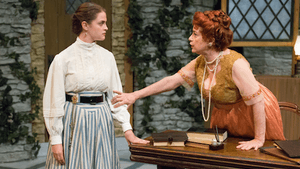Stay in the Loop
BSR publishes on a weekly schedule, with an email newsletter every Wednesday and Thursday morning. There’s no paywall, and subscribing is always free.
An 1893 play for today
Lantern Theater Company presents Shaw's 'Mrs. Warren's Profession'

George Bernard Shaw's advocacy for women's rights and economic concerns merged in many of his plays, but in none so effectively as his notorious 1893 drama Mrs. Warren's Profession, which receives a spirited revival by Lantern Theater Company.
Shaw's play is relevant today, as women still face economic discrimination, making $.79 for every $1.00 a man makes for the same work. He also bravely portrayed prostitution, a word that could not even be uttered on the English stage then, as one of the few economically viable choices for women at the time. Plays only dared broach the subject from a traditional moral perspective, portraying prostitutes as sinners who must be punished. Shaw paid a price for his frank, sympathetic, economically accurate view: the play was banned in England until 1924, and produced but banned, and the cast jailed, in New York City in 1905.
More than an idea
Shaw's play succeeds not only because the legality and morality of prostitution are still debated today, or because women's economic equality is not yet assured, but because it's an involving drama about an unusual mother-daughter relationship. Mary Martello plays Mrs. Kitty Warren, whose boarding-school-raised daughter Vivie (Claire Inie-Richard) became a Cambridge academic star. When they meet in a Surrey garden (nicely realized, and cleverly morphed into three other locations, by Dirk Durossette), Vivie fancies herself an independent woman, while Kitty still imagines a little girl.
The men around them illuminate the mother-daughter confrontation. David Bardeen's Praed is a polite, culturally wise pal of Kitty's. Andrew Criss plays Sir George Crofts, a cunning businessman who bought his title: "the most vicious sort of London man about town," Vivie perceives. The Reverend Samuel Gardner (John Lopes) is soon revealed as one of Kitty's customers in his misspent youth, though so concerned about his social position now that admitting it gives him fits. His charming lay-about son Frank (Daniel Frederick) dotes on Vivie, scheming to marry her and live on Kitty's money.
The play refutes the damage done by popular piffle both in Shaw's time and today (exhibit one: the film Pretty Woman), which promotes the fantasy that prostitution can lead to romantic bliss with a handsome rich guy. Sir Crofts oozes evil when he proposes to Vivie, offering his early death and her subsequent inheritance as inducement to sell her body and identity to him. Fortunately, Vivie's smarter and prouder than any character Julia Roberts ever played.
Overdone emotions
Director Kathryn MacMillan's snappy production delivers Shaw's comedy without exaggeration and recognizes the drama in the characters's spirited negotiations. What Shaw detractors dismiss as "talky" is actually passionate debate between smart characters about life-changing decisions. Other than some busy staging, making characters stroll hither and yon to add physical distraction when the intellectual and emotional action should be enough, this production mostly succeeds.
This well-acted version breaks down, however, in Inie-Richards's portrayal of Vivie who, in the drama’s final two scenes, falls to the temptation to over-emote. As any good acting teacher will explain, yelling makes characters weak, and that's exactly what Vivie cannot be. Shaw clearly provides directions that work against that tendency. Inie-Richards turns Vivie's final confrontation with Kitty into a screaming, crying mess, though what should overwhelm Kitty is Vivie's lack of emotional engagement; it's an American approach to a distinctly English confrontation.
Martello's performance rules the play. Her Mrs. Warren is appropriately charming, commanding, and conniving. Her flirtations with her daughter's boyfriend Frank particularly show how much she enjoys her powers. Costume designer Janus Stefanowicz realizes her brashness very well, with colorful costumes thisclose to bad taste. What Kitty cannot master, however, is her daughter, who is shaping her own path through a man's world. It’s a trajectory that flatly rejects not only her mother's moral compromises, but also her emotional outbursts.
What, When, Where
Mrs. Warren's Profession. By George Bernard Shaw, Kathryn MacMillan directed. Through Oct. 16, 2016 at Lantern Theater Company, St. Stephen's Theater, 10th and Ludlow Sts., Philadelphia. (215) 829-0395 or lanterntheater.org.
Sign up for our newsletter
All of the week's new articles, all in one place. Sign up for the free weekly BSR newsletters, and don't miss a conversation.

 Mark Cofta
Mark Cofta